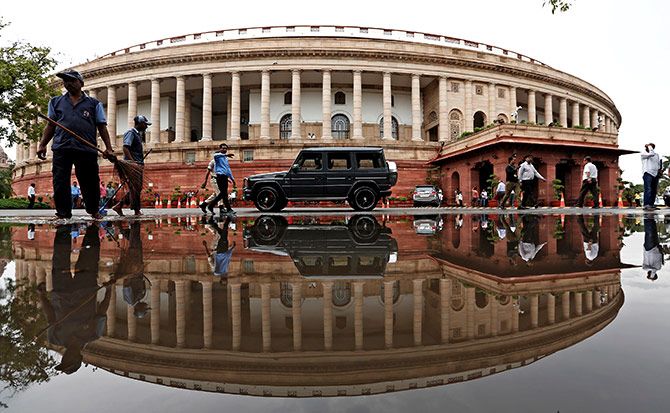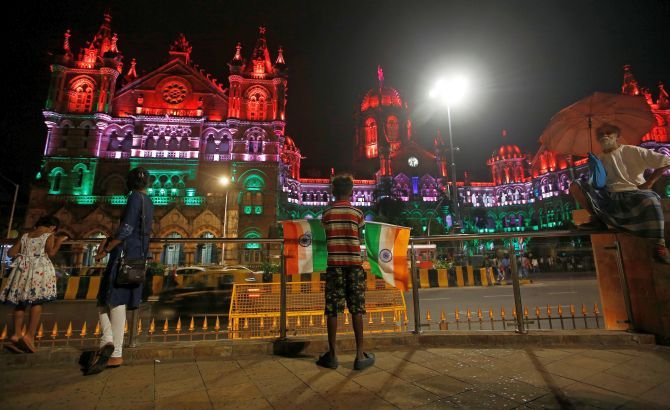'If India maintains the Constitutional set-up that its founders envisaged -- which is that it is a parliamentary democracy, with a broadly speaking market economy, in which all people are equal as everyone votes, in which the rights of minorities are respected -- that will be a great thing.'
'Not just for India. But for humanity.'

In the first segment of a multi-part interview with Vaihayasi Pande Daniel, James Crabtree, author of the well received book on India, The Billionaire Raj, doubted if Prime Minister Narendra Damodardas Modi could win a mandate in the next general election as impressive as the one he won in 2014.
Crabtree spent five years in India as the correspondent for the Financial Times before he moved to Singapore to teach at the Lee Kuan Yew School of Public Policy in 2016.
"We all have a big stake in India's success," he tells Rediff.com in the second segment of the interview.
How do you describe India to someone who has never been here?
As a journalist one of the things that I often say is that India is a delightful place to be a foreign correspondent.
Indians like to talk. It is quite open. The elite all speak English so you don't have to learn a prohibitively difficult foreign language. Mostly it is an open society.
Compare that to China -- it is very difficult because the language is incredibly hard, the elite don't like to talk. You can't have tea with business leaders or pop in to see politicians. You don't get good access.
As a journalist what you want above all is access and that's what I feel I got with the book.
Almost everyone in that book, apart from Modi, who I have only watched, I met. Most of them I know quite well, have their mobile numbers, I could get in contact with them if I wanted to.
That's partly because I work for the Financial Times which is a prestigious paper, but is partly a reflection of the fact that India is a very open place. People like to talk.
India is also very well connected to the West. They go to London on a holiday. They send their kids to American universities.
This is a global country and the argument in the book is that India is a much more globalised economy than people realise outside of India. So that's the big difference.
In that sense Delhi is much more like Washington or London, than Beijing. An open talkative city as opposed to a closed secretive city.
As a journalist you want to be able to talk to people more than anything. And as I say Indians like to talk. Great place to be as a foreign correspondent. I feel very lucky in that respect.

"Yet perhaps because Indian society has long been deeply stratified, this dramatic increase in inequality has not received as much global attention as it deserves." A boy selling flags awaits customers opposite Mumbai's famed Chhatrapati Shivaji Terminus, illuminated in the colours of India's national flag, August 14, 2018. Photograph: Francis Mascarenhas/Reuters
One third of the focus of your book is about India's inequalities. If the inequality continues it could have consequences. What kind of consequences? Something as bad as a revolution or a rebellion?
At the discussion at the Nehru Centre in Mumbai on August 6, economist Shubhada Rao said India has inclusive inequality. You didn't seem to agree because so much more had to be done in terms of health etc for it to be inclusive and that was air brushing it.
But what is the real fear?
When people talk about inclusive growth, that is a phrase used to describe East Asia, where countries grew very fast, but they grew in a way that included lots of people at the bottom, people who left agriculture to work in factories and then moved up the chain.
I think it is hard to say that kind of growth is the way you would describe India.
Now India has had a very good record on poverty reduction in absolute numbers, hundreds of millions of people.
But those people who are just above the poverty line are not prospering. They may not be earning 2 dollars a day, they might be earning 3 dollars a day. And at the same time -- the reason the book is called The Billionaire Raj -- is that the top ten percent, particularly the top one percent in India, have been doing very well.
You might say that's also true in America or Britain. That's fair enough. They are very different kinds of countries. And the risk is for India, as it grows over the next 20 years, it keeps getting more unequal. That's a big problem.
WATCH what James Crabtree has to say about India's problem of inequality. Video: Afsar Dayatar/Rediff.com
Your fear is that India will never rise out of that?
The fear is that India will become more and more unequal. If it has an economic model already where the country has become much more unequal over the last ten or 15 years, then over the next 10 or 15 years, if nothing is done, the danger is that it will continue to happen.
That's a problem for all sorts of reasons. Really extreme inequality -- some level of inequality is fine; all countries are to some degree unequal. Successful economies of East Asia were pretty unequal. They are not Sweden. But you don't want to be where Brazil is.
My worry is that if you are very, very unequal, your politics tend to be less stable, it is more difficult to agree to economic reforms that require there to be winners and losers.
In a very, very unequal country it is less easy to create that kind of consensus for change.
People in very unequal countries are just less happy. They feel relatively worse off because, although they are doing okay, other people might be doing much, much better. All sorts of reasons why suteric extreme in equality is a bad thing. That does worry me.
On the other hand the optimistic point is that India is really only at the start of its growth process.
If it is puts in measures now that can help to put a lid on inequality, particularly make sure the rich pay their taxes and provide the beginnings of a system, that can give some sense of security to those who are less well off, then I think things over the next 10 or twenty years could get quite a lot better.
No reason for pessimism about these things, but it is not going to happen by accident.

What have you learned from India? How has India widened your horizons?
In a practical sense: My background is in policy and not in business per se. I have worked for the British prime minister's office, I have worked for a think-tank, I was deputy editor of a magazine.
I often say I could have talked about capitalism but I couldn't tell you how to read a balance sheet. When I came here as a reporter I had to learn how to understand business.
In a funny way that was something (new) you are probably looking for me to say something kind of mystical but in a very practical sense being a business journalist, which wasn't my background, helped me understand business, capital markets, investments in a way that I didn't before.
That's the background of the book. It is about business leaders.
I suppose in the West business is much more boring than here. People who lead Western companies are generally quite dull.
So India also taught me to be fascinated with entrepreneurs, tycoons, that is what this book is all about.
It was coming here, seeing business people who are unlike anything that we have seen in the West for 100 years or more, whether it was the people who built the cotton mills in Britain or the railways in America...
That is what the book is about. We have billionaires in the West, lots of billionaires. We don't have tycoons really.
The idea of people who run these kinds of businesses, big conglomerates, family owned, this is a sort of a lost art in industrialised economies, not just in the West, in Japan too. So that was something I became fascinated by.
You said at the discussion at the Nehru Centre, 'I have a meta argument to make about India that everyone outside of India needs to care about India much more than they do at a moment in our world when many of the emerging powers in our world are slipping in the wrong direction.'
'China is very clearly sliding backwards to becoming a neo-Leninist autocracy, Russia appears to be a lost cause, you go down the list it is not a very pretty picture, therefore the success of India and whether or whether not India will become something which actually sounds quite boring, a middle income parliamentary democracy with a broadly market economy in which all the people can live together protected by the rights under its Constitution if that visions happens it would be an amazing thing not just for India but for the world.'
Why do you feel this is important for the rest of the world?
India is the swing superpower of the 21st century, right?
In the end the 21st century is going to come down to three countries -- America, India and China.
These are the three big powers. You have some others around the edges -- the European Union, Russia what have you -- but really those three.
And which way is India going to go?
Best that India went in a positive direction?
Don't get me wrong, don't get me wrong: I don't think India is going to turn into a kind of Western country or be a Western ally.
India is going to be its own thing.
If India maintains the Constitutional set-up that its founders envisages, which is that it is a parliamentary democracy, with a broadly speaking market economy, in which all people are equal as everyone votes, in which the rights of minorities are respected -- a large, successful, relatively prosperous Asian democracy -- that will be a great thing.
Not just for India. But for humanity.
One seventh of all people would be living in India, whatever it is, one seventh or one sixth. By the middle of this century that will be 1.5 billion to 1.6 billion people -- you know the Greatest Democratic Experiment in Human History.
So both for the sheer weight of numbers in India, but also because of its position vis-a-vis China and its position as a kind of bulwark in the slide towards authoritarianism.
If India does indeed become -- as I hope that it doesn't, and don't think that it will -- a more authoritarian, illiberal place, then that would be quite a severe blow to those of us who think that, in the end, people who live under liberal democracies tend to be happier and better off than those that don't.
So we all have a big stake in India's success.
- Part 3 of the James Crabtree Interview: 'The system is holding Indians back'










